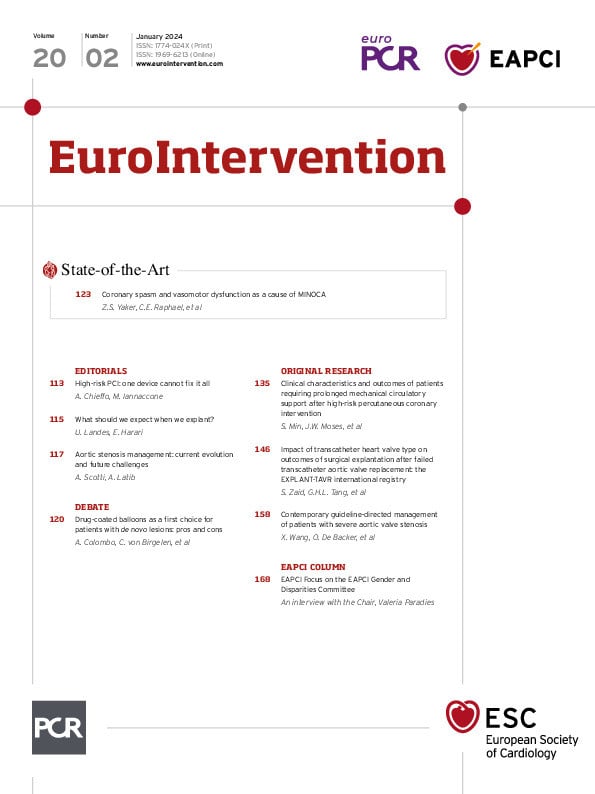In this issue of EuroIntervention, Min and colleagues1 report a subanalysis of the PROTECT III study2, which included patients who did or did not require prolonged mechanical circulatory support (MCS) with Impella (Abiomed) in the context of high-risk percutaneous coronary intervention (HR-PCI)345.
Beyond assessing complex coronary anatomy, the pivotal factor in determining whether a procedure is high risk is a comprehensive evaluation of the patient. In this context, the “high-risk PCI” definition6 offers specific indications; it considers a range of parameters, including cardiac factors like severe valvulopathy and/or reduced left ventricular ejection fraction (LVEF), as well as general non-cardiac comorbidities. These considerations are critical as they may either contraindicate cardiac surgery or suggest increased procedural risk. The present subanalysis included 1,155 patients, predominantly male (72.7%), with a high prevalence of cardiovascular risk factors such as hypertension (92.0%), diabetes (54.8%), and severely reduced LVEF (mean 33.9%). Although limited information was provided regarding non-cardiac comorbidities, the characteristics of patients included in the study appear to closely meet the definition of HR-PCI. It is plausible that within the entire cohort, the 16.4% of patients who necessitated extended mechanical circulatory support (MCS) were, indeed, characterised at “higher risk” when compared to their counterparts. Such increased clinical risk may be justified by the elevated incidence of acute coronary syndrome (ACS) presentation, lower arterial pressure, higher heart rate, more pronounced LVEF impairment, more severe concurrent valvular disease, a higher prevalence of atrial fibrillation, and increased use of the Impella CP. Consequently, the patients who required prolonged MCS support experienced significantly higher rates of in-hospital and 90-day major adverse cardiovascular and cerebrovascular events (MACCE). This was primarily driven by all-cause mortality (in-hospital: 10.0% vs 2.7%; 90-day: 17.3% vs 9.2%) and myocardial infarction (in-hospital: 2.6% vs 0.7%; 90-day: 6.1% vs 3.0%). Interestingly, there was no difference in vascular complications.
The findings presented by the authors imply that the HR-PCI definition may have limitations in effectively identifying patients at exceptionally high risk. This limitation arises for several reasons. It is widely acknowledged that there is a continuum between acute and chronic medical conditions, particularly in the context of patients presenting with cardiogenic shock (CS) at the initial stages. Normotensive CS (Society for Cardiovascular Angiography & Interventions [SCAI] class B)7 can be misleading and may rapidly deteriorate into a more severe CS SCAI class. Nevertheless, the PROTECT III study included patients with acute coronary syndrome (ACS), including ST-elevation myocardial infarction without an SCAI class C-E CS diagnosis, within the HR-PCI setting. However, the subset of patients who required prolonged support (mean duration 25.2±32.1 hours) underwent revascularisation more frequently in an urgent setting (61.6% vs 48.5%) due to ACS and, as discussed previously, had worse haemodynamic data, such as higher heart rates and lower systolic blood pressure, leading to a higher mortality8. Therefore, we cannot exclude that, in this group, a larger number of early CS SCAI classes were included, and this may have impacted on the study results.
Another possible explanation for the requirement of prolonged support could be the rapid adaptation of the heart to mechanical circulatory support. In case of severely reduced cardiac output, the flow from the Impella device may surpass the native flow, inducing a state of left ventricular uncoupling that necessitates extended support. However, this exposes the patient to the risk of additional device-related complications5.
On the other hand, it’s essential to acknowledge the primary limitation of this study, as recognised by the authors. This analysis is a post hoc evaluation, and the investigators did not gather specific data elucidating the rationale or pathology underlying the operator’s decision to retain the MCS device post-procedure. Therefore, it is not possible to exclude potential operator bias attributable to experience or preference, which could have influenced the outcomes. Thus, further studies are imperative to elucidate the appropriate postprocedural management of MCS devices and guide physician decision-making.
Conflict of interest statement
A. Chieffo has received consulting fees/honoraria from Abiomed, Abbott Vascular, Cardinal Health, Biosensors, and Magenta Medical. M. Iannaccone has no conflicts of interest to declare.

